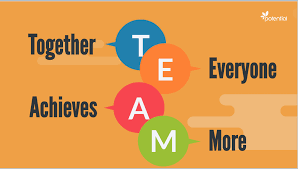The Importance of Teamwork in Achieving Success
Teamwork is a crucial element in the success of any endeavour, whether it be in the workplace, on the sports field, or within a community project. A team is a group of individuals working together towards a common goal, pooling their skills, knowledge, and resources to achieve objectives that may be unattainable by individuals working alone.
One of the key benefits of teamwork is the diversity of perspectives and expertise that team members bring to the table. Each member has their own unique strengths and experiences, which can complement those of others and contribute to a more comprehensive approach to problem-solving and decision-making.
Effective teamwork also fosters collaboration and communication among team members. By working together towards a shared goal, team members learn to trust each other, share responsibilities, and support one another through challenges. This sense of unity and camaraderie can boost morale, motivation, and overall productivity.
Furthermore, teamwork allows for greater efficiency and effectiveness in achieving goals. By dividing tasks among team members based on their strengths and expertise, teams can work more efficiently towards completing projects or solving problems. Additionally, when faced with obstacles or setbacks, teams can brainstorm solutions collectively and adapt more quickly to changing circumstances.
In conclusion, teamwork plays a vital role in achieving success across various domains. By harnessing the power of collaboration, communication, and shared goals, teams can overcome challenges, drive innovation, and accomplish remarkable feats that would be impossible for individuals working in isolation.
Five Key Strategies for Fostering Effective Teamwork and Collaboration
- Communicate openly and regularly with your team members.
- Encourage collaboration and teamwork to achieve common goals.
- Recognize and appreciate the contributions of each team member.
- Provide constructive feedback to help improve individual and team performance.
- Establish clear roles, responsibilities, and expectations within the team.
Communicate openly and regularly with your team members.
Effective communication is the cornerstone of successful teamwork. It is essential to communicate openly and regularly with your team members to ensure that everyone is on the same page, aligned with goals, and informed about progress. By fostering a culture of transparent communication, team members can share ideas, provide feedback, address concerns, and collaborate more effectively towards achieving common objectives. Open communication builds trust, strengthens relationships, and enhances overall team dynamics, leading to improved productivity and success in any collaborative endeavour.
Encourage collaboration and teamwork to achieve common goals.
Encouraging collaboration and teamwork is essential in achieving common goals within a team setting. By fostering an environment where team members work together towards a shared objective, individuals can leverage their diverse skills and perspectives to tackle challenges more effectively. Through collaboration, team members can combine their strengths, support each other’s weaknesses, and ultimately enhance the overall performance and success of the team. Emphasising teamwork not only promotes unity and cohesion but also cultivates a sense of collective achievement and motivation among team members.
Recognize and appreciate the contributions of each team member.
In any team setting, it is essential to recognise and appreciate the contributions of each team member. Acknowledging the unique skills, efforts, and perspectives that individuals bring to the team not only boosts morale but also fosters a sense of value and belonging among team members. By showing appreciation for each person’s contributions, teams can cultivate a positive environment that encourages collaboration, motivates individuals to excel, and ultimately leads to greater success in achieving shared goals.
Provide constructive feedback to help improve individual and team performance.
Providing constructive feedback is a fundamental aspect of fostering growth and enhancing both individual and team performance. By offering specific and actionable feedback, team members can identify areas for improvement, build upon their strengths, and develop new skills. Constructive feedback not only helps individuals strive for excellence but also contributes to the overall success of the team by promoting a culture of continuous learning and development. Effective feedback mechanisms enable teams to address weaknesses, capitalize on opportunities for growth, and ultimately work together towards achieving shared objectives with greater efficiency and effectiveness.
Establish clear roles, responsibilities, and expectations within the team.
Establishing clear roles, responsibilities, and expectations within a team is essential for fostering effective teamwork and achieving success. By defining each team member’s role and outlining their specific responsibilities, clarity is created regarding who is accountable for what tasks. This not only helps in avoiding confusion and duplication of efforts but also ensures that everyone understands their contribution towards the team’s common goals. Setting clear expectations also enables team members to align their efforts, work collaboratively, and hold each other accountable, leading to improved efficiency, productivity, and overall cohesion within the team.
Tags: collaboration, communication, decision-making, diversity, effectiveness, efficiency, expertise, goals, morale, motivation, perspectives, problem-solving, productivity, success, team, teamwork, trust, unity
